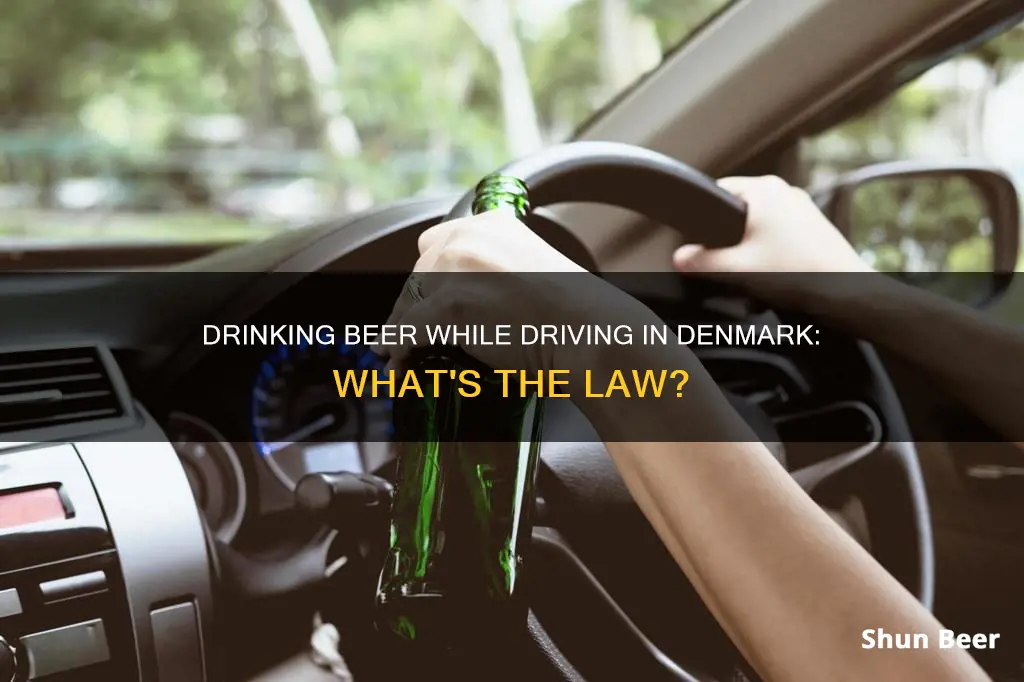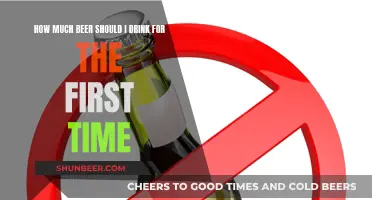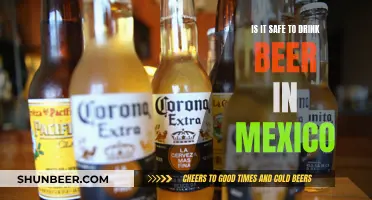
Denmark has strict laws against driving under the influence of alcohol. The blood alcohol limit in Denmark is 0.5 per thousand, which is equivalent to approximately two drinks. If a motorist is found to have a blood alcohol level of 1.5 or more, they can expect a serious fine, and if it's over 2.0, they may face imprisonment. In recent years, Denmark has introduced a number of measures to tackle drink-driving, including the introduction of screening breath analysers for police enforcement and Alcohol Interlock programmes for offenders.
| Characteristics | Values |
|---|---|
| Legal blood alcohol limit | 0.5g/l or 0.5 per thousand |
| Blood alcohol level produced by two drinks | 0.8 |
| Fine for blood alcohol level of 1.5 | Serious fine |
| Consequence of blood alcohol level of more than 1.5 | Loss of license |
| Blood alcohol level produced by six or seven drinks | 2.0 or more |
| Consequence of blood alcohol level of 2.0 or more | Prison term of at least 14 days |
| Yearly number of police alcohol checks | Not collected |
| Number of alcohol-related road deaths in 2010 | 64 |
| Number of alcohol-related road deaths in 2018 | 32 |
| Official number of alcohol-related road deaths in 2019 | 38 |
What You'll Learn

Denmark's blood alcohol limit
Denmark has strict laws in place to tackle drink-driving. The legal blood alcohol concentration (BAC) limit for driving in the country is 0.5g/l or 0.05%. This limit was adopted in 1998, and there has been no further lowering of the alcohol limit since. The limit applies to all motor vehicle drivers and is enforced through screening breath analysers for police enforcement and sanctions for drink-driving offences.
The number of alcohol-related road deaths in Denmark has decreased significantly due to the implemented measures. In 2010, there were 64 alcohol-related road deaths, which decreased to 32 in 2018. The official number of alcohol-related deaths in 2019 was 38, while figures for 2020 are not yet available.
To further combat drink-driving, Denmark has introduced several measures over the last decade. In 2015, the country implemented an Alcohol Interlock programme for offenders, followed by a change in the programme in 2017, allowing up to three years with an Alcohol Interlock instead of licence suspension. Additionally, The Danish Road Safety Council (Sikker Trafik) launched a campaign called "There are many ways to stop a drink-driver. What's yours?" to encourage family and friends to take action against potential drivers under the influence.
It is important to note that Denmark's legal blood alcohol limit of 0.05% is relatively low compared to other countries. Some countries have higher limits, such as the United States, which has a limit of 0.08%, and Canada, which varies between 0.04% and 0.08% depending on the province. However, there are also countries with lower limits, such as France, with a limit of 0.05%, and Norway, with a limit of 0.02%.
While Denmark has made significant progress in reducing drink-driving incidents and related deaths, it is essential for drivers to adhere to the legal blood alcohol limit and drive responsibly to ensure the safety of everyone on the road.
Mixing Vyvanse and Beer: What You Need to Know
You may want to see also

Drunk driving penalties
Denmark has strict laws regarding drinking and driving, with a legal blood/alcohol limit of 0.5g per thousand. This limit is strictly enforced, and anyone caught breaking it will face heavy fines and imprisonment. If caught over the limit when involved in an accident, a prison sentence will usually be issued.
First-time offenders are likely to have their licenses suspended and will be required to take self-paid obligatory alcohol and traffic courses. If alcohol levels are high, greater penalties are enforced, and repeat offenders risk a prison sentence.
Denmark introduced a penalty point system in 2005, which operates for driving offences. One penalty point is issued for each offence, and after three penalty points (or two for new drivers) within three years, the driver is conditionally suspended. This means that the driver may be able to keep their license if they complete and pass a driving test involving both a theory and practical element. If the test is failed, the police keep the driver's license until the test is passed. Once a driver has been issued with a conditional suspension and passed the required driving test, they are then on probation for the next three years, where any other traffic offences lead to the license being suspended unconditionally for at least six months.
The following measures have been introduced in Denmark over the last decade to target drink-driving:
- 2010 – Introduction of screening breath analysers for police enforcement
- 2015 – Introduction of Alcohol Interlock programme for offenders
- 2017 – Change in the AI programme for offenders: up to three years with an Alcohol Interlock instead of a license suspension
How Long Does Beer Last After Opening?
You may want to see also

Police alcohol checks
In Denmark, the police enforce a strict drink-driving limit, with a blood alcohol concentration (BAC) limit of 0.5g/l or 0.5 per thousand. This limit is equivalent to approximately two drinks, and the rule of thumb is simply to not drink and drive. The Danish police do not collect data on the number of alcohol checks they perform, but a 2018-2019 roadside study of 120,000 randomly selected drivers showed that 0.2% had a BAC above the legal limit. This resulted in a total of 235 charges.
If you are stopped by the police on suspicion of drink-driving, they will likely administer a breathalyser test to measure your BAC. If your BAC is found to be 1.5 or more, you will face a serious fine. A BAC of over 2.0, which is usually produced by six or seven drinks, can result in a prison term of at least 14 days.
For first-time offenders, the penalties for drink-driving include a fine worth your monthly salary multiplied by your BAC, a mandatory Alcohol, Narcotics and Traffic (ANT) course costing 3200DKK, and the loss of your licence for three years. You may also be required to have an alcohol interlock installed in your vehicle for up to three years.
The penalties for drink-driving in Denmark are designed to deter people from driving under the influence and to make it socially unacceptable. The Danish Road Safety Council's campaign, "There are many ways to stop a drink-driver. What's yours?", encourages family and friends to take action if they know someone is planning to drive under the influence.
Tanning with Beer: Does It Work?
You may want to see also

Alcohol Interlock programme
In Denmark, drinking and driving is an offence. The legal blood alcohol concentration (BAC) limit for all drivers is 0.5 g/l. Denmark has implemented several measures to tackle drink-driving, including the introduction of screening breath analysers for police enforcement in 2010 and the Alcohol Interlock programme in 2015.
The Alcohol Interlock programme is a rehabilitation measure for drink-driving offenders, aimed at preventing repeat offences. It was first introduced in Denmark as a voluntary programme in 2015, but due to low uptake, it was made mandatory in 2017 for certain categories of offenders. The programme requires participants to have an ignition interlock device installed in their vehicle. An ignition interlock device is a breathalyzer that connects directly to the engine's ignition system. The driver must blow into the device, and if their breath-alcohol concentration is above the programmed limit, the engine will be prevented from starting.
The Alcohol Interlock programme in Denmark has two categories: a voluntary programme and a mandatory programme. The voluntary programme is for first-time offenders with a BAC above 2 g/l, or second-time offenders with a BAC above 1.2 g/l. The mandatory programme is for second-time offenders with a BAC level higher than 1.2 or first-time offenders with a BAC level higher than 2.0. Offenders in the programme can choose between a one-year and a two-year alternative, with the two-year programme being assigned to more severe cases.
The Danish alcohol, drugs, and traffic course (ANT course) is another rehabilitation measure offered by the five Danish regions. The 12-hour course, taught by alcohol therapists or substance abuse consultants, helps offenders regain their driver's licence following a conviction for drug or drink-driving.
Beer Drinking on Holden Beach: What's Allowed?
You may want to see also

Drinking laws for under-18s
Denmark has no legal drinking age requirement. However, there are laws in place to prevent minors from buying alcohol. For instance, to buy alcoholic beverages in shops, one must be at least 16 years old, and the drink's ABV must be between 1.2% and 16.5%. To purchase alcohol with an ABV above 16.5% in stores or alcoholic drinks in restaurants, bars, and clubs, one must be 18 years old.
The Danish Health Authority has issued guidelines advising against alcohol consumption for those under 18. This is due to evidence of the detrimental effects of alcohol on the developing brain, impacting memory, learning, planning, decision-making, impulse control, and language. The guidelines also aim to reduce the increased risk of accidents, violence, and unwanted sexual experiences associated with excessive alcohol consumption among minors.
While Denmark allows individuals under 18 to consume alcohol, it is essential to prioritize health and safety. The Danish Health Authority's guidelines provide valuable insights into the potential risks and encourage individuals to make informed choices regarding alcohol consumption.
Ranitidine and Beer: Safe to Mix?
You may want to see also
Frequently asked questions
The legal blood alcohol limit in Denmark is 0.5 per thousand, or 0.5g/l, which is equivalent to approximately two drinks.
If your blood alcohol level is 0.8 or more, you will face a serious fine. If it's 1.5 or more, you may lose your license. If it's 2.0 or more, you could face a prison term of at least 14 days.
Denmark has introduced several measures to target drink-driving, including screening breath analysers for police enforcement and the Alcohol Interlock programme for offenders. The Danish Road Safety Council also runs campaigns to encourage family and friends to prevent a potential driver from getting behind the wheel while intoxicated.







